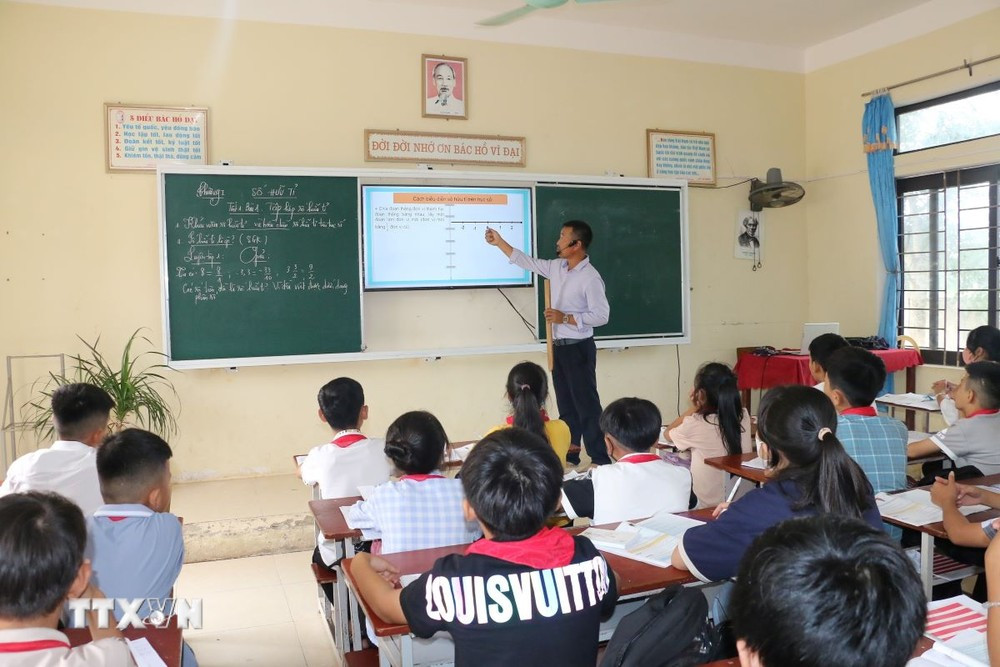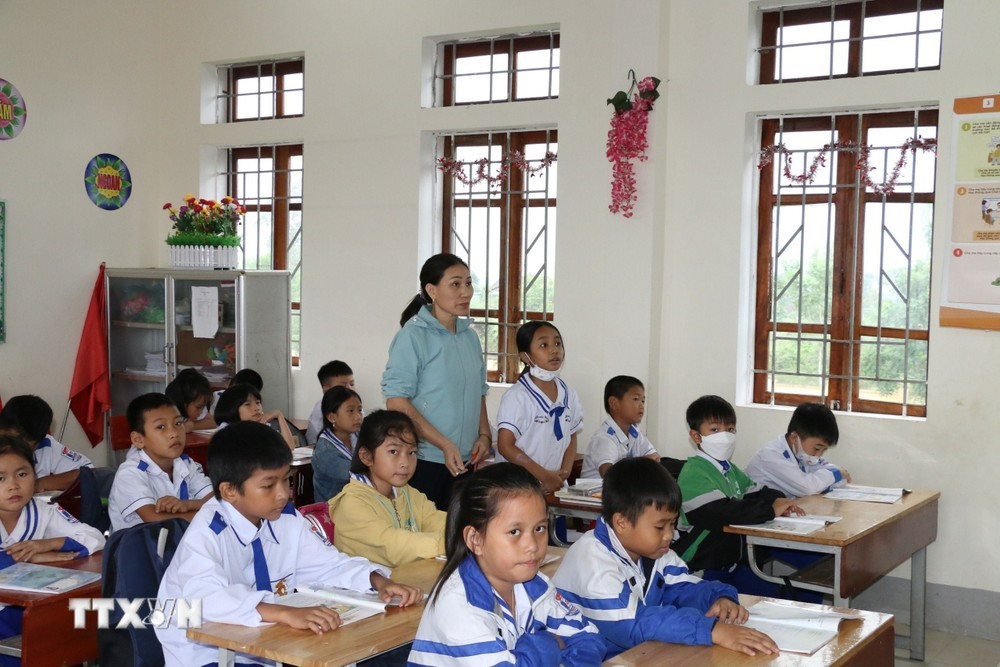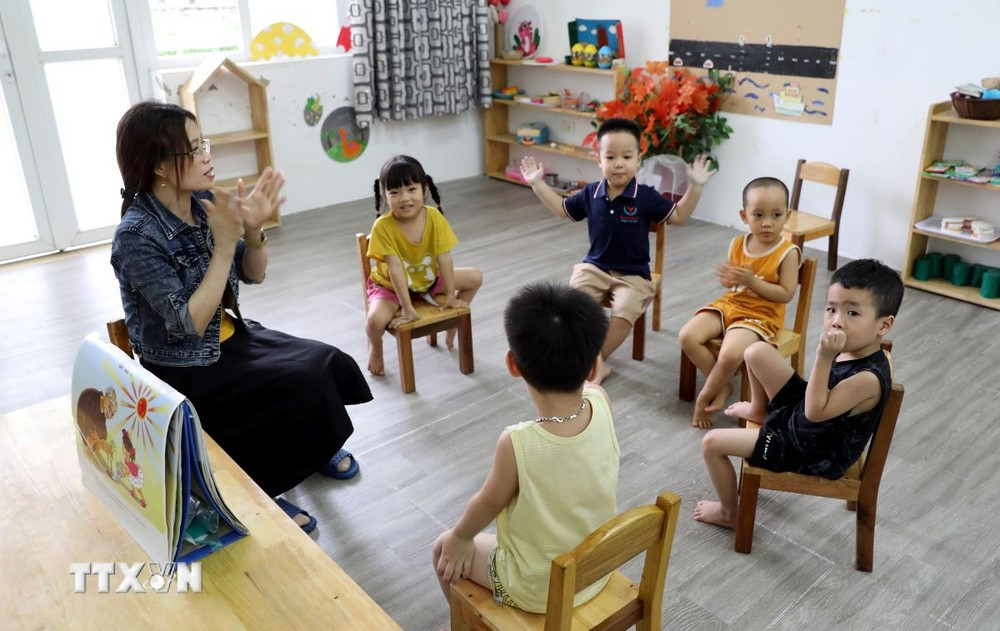Politburo: Implementing the policy of giving teachers' salaries the highest priority
Implementing the policy that teachers' salaries are given the highest priority in the administrative and career salary scale system and have additional allowances depending on the nature of the job and the region...

On behalf of the Politburo, on August 12, Standing member of the Secretariat Luong Cuong signed and issued Conclusion No. 91-KL/TW of the Politburo (Conclusion No. 91) on continuing to implement Resolution 29-NQ/TW of 2013 "On fundamental and comprehensive innovation of education and training, meeting the requirements of industrialization and modernization in the conditions of a socialist-oriented market economy and international integration".
Conclusion No. 91 emphasizes that in order to promote the achievements and effectively overcome the above limitations and shortcomings in order to continue to promote fundamental and comprehensive innovation in education and training to meet the requirements of national development in the new period, adapt to the Fourth Industrial Revolution and the strong development of digital technology and artificial intelligence, bringing Vietnamese education and training to the advanced level of the Asian region by 2030 and the advanced level of the world by 2045, the Politburo requests Party committees at all levels, the government, the Vietnam Fatherland Front and socio-political organizations to continue to thoroughly grasp and seriously and effectively implement the viewpoints, goals, tasks and solutions stated in Resolution 29-NQ/TW, Resolution of the 13th National Congress and other resolutions of the Party on education and training; at the same time, focus on performing the tasks well.
Specifically, Party committees, Party organizations, authorities, local and unit leaders continue to raise awareness, strengthen leadership responsibility, thoroughly direct and fully implement the viewpoint of considering education and training as the "top national policy", the cause of the Party, the State and the entire people; ensure the leading role of the State, at the same time, attract the active participation of society in developing the cause of education and training; investment in education and training is investment for development, given priority in socio-economic development programs and plans.
Conclusion No. 91 mentions focusing on reviewing, amending, supplementing, and perfecting mechanisms, policies, and laws on education and training, removing bottlenecks, including the need to soon develop the Law on Teachers, the Law on Lifelong Learning, the Education Development Strategy, and regulations on innovation in education and training management and school governance in a scientific, modern, synchronous, and interconnected direction, in line with the international integration process and practices in our country.
Improve the effectiveness of State management of education and training; promote decentralization and delegation of power; strengthen the role of State management agencies of education and training in deciding on staffing, organizational structure, policies for teachers and allocating the State budget to the education sector.
Increase autonomy, enhance accountability, promote democracy in educational and training institutions; perfect policies and mechanisms of autonomy for higher education institutions in line with the general trend of the world...

The conclusion emphasizes continuing to improve the quality of comprehensive education at all levels of preschool, general education, continuing education, and political and ideological education for students. In particular, promulgating and effectively implementing a new preschool education program with advanced content and methods, suitable to practical conditions; gradually implementing universal preschool education for 3-4 year old children; closely managing non-public preschool education facilities, especially groups of children, kindergartens, and independent preschool classes.
Continue to perfect and effectively implement the new general education program, focusing on strongly innovating teaching and learning methods towards promoting the positivity, proactiveness and creativity of teachers and learners; comprehensively developing learners' capacity and qualities.
Implement a unified national general education program, each subject has one or several textbooks and socialize the compilation of textbooks; implement 9 years of compulsory education.
Develop continuing education with diverse content and forms to meet people's lifelong learning needs. Reduce illiteracy rates in extremely disadvantaged areas and ethnic minority areas.
Focus on investing in modernizing vocational education, university education and enhancing scientific research potential in educational and training institutions.
Continue to develop vocational education in an open, flexible, modern, effective, integrated direction, linked to the labor market, focusing on quantity, structure, and quality of training, paying attention to retraining and regular training for workers to adapt to changes in market demand and production technology...
Along with that, focus on in-depth investment, facilities, high-quality human resources for vocational education institutions, public universities in a number of industries, professions, and fields of regional and international stature to create breakthroughs, strong and comprehensive changes in the quality of training high-level human resources associated with research, development of science, technology and innovation to meet the requirements of industrialization, modernization of the country, national digital transformation and international integration; focus on industries and fields that meet the requirements of developing a knowledge economy, digital economy, green economy, circular economy, especially basic sciences, engineering, technology and new industries such as artificial intelligence, data science, semiconductors, etc.
Implement the policy of giving teachers' salaries the highest priority.
Section 6, Conclusion No. 91 of the Politburo states: Develop, improve the quality, standardize the team of teachers and educational managers at all levels; ensure sufficient number of teachers according to prescribed norms; study mechanisms and policies for mobilizing and rotating teachers between localities to fundamentally resolve the situation of local teacher surplus and shortage and improve the quality of education for disadvantaged areas.
Innovate state management of teachers in a synchronous manner, associated with professional and quality management.
Strongly innovate the mechanism and policies for discovering, recruiting, using, training, rewarding and promoting talents working in the education sector; implement the policy that teachers' salaries are given the highest priority in the administrative and career salary scale system and have additional allowances depending on the nature of the job and the region...

The conclusion emphasizes the need to continue to innovate management mechanisms, ensure adequate facilities and financial resources for education and training development; ensure that the State budget for education and training accounts for at least 20% of the total State budget expenditure as set out in Resolution No. 29-NQ/TW.
At the same time, promptly adjust and increase the level of State budget expenditure for education and training in accordance with economic growth.
The State ensures funding for compulsory education, universal education, tuition exemption for 5-year-old preschool children and carries out key tasks in the education sector; prioritizes investment in education and training in ethnic minority, mountainous, border and island areas.
Focus on investing in modernizing vocational education, university education and enhancing scientific research potential in educational and training institutions; Continue to perfect the national education system in an open, flexible, interconnected direction, promote a learning society and lifelong learning; promote international integration in education and training to meet the requirements of improving the quality of human resources to serve the country's development in the new period...
After 10 years of implementing Resolution No. 29-NQ/TW, dated November 4, 2013 of the 11th Party Central Committee "On fundamental and comprehensive innovation of education and training, meeting the requirements of industrialization and modernization in the conditions of a socialist-oriented market economy and international integration," our country's education and training have achieved many important results.
The whole country has completed universal preschool education for 5-year-old children; firmly maintained and gradually improved the quality of universal primary and secondary education; general education has positively shifted from mainly equipping knowledge to comprehensively developing learners' qualities and capacities; the quality of mass and key general education has increasingly improved.
Continuing education has developed in a variety of content and forms; movements to compete in learning, encourage learning, encourage talents, and build a learning society have been implemented with attention. Vocational education has developed strongly in quantity and focused on improving quality step by step to better meet the needs of the labor market.
Continuing innovation in higher education, combined with increased autonomy, has created new momentum and strong changes in quality and efficiency in human resource training and scientific research; the number of training programs accredited and published in international scientific publications has increased sharply, and a number of higher education institutions and training groups have been ranked highly in the region and the world.
Teaching and learning methods, testing, and assessment of educational quality have been innovated in a modern direction, becoming increasingly more practical and effective.
The team of teachers and basic education managers is standardized, gradually ensuring quantity.
Facilities and teaching equipment have been improved, initially meeting the requirements of educational and training innovation.../.


